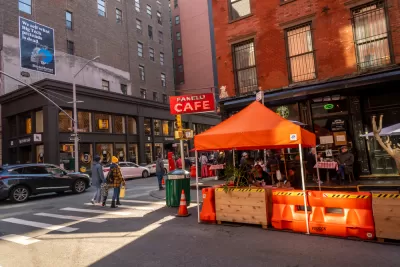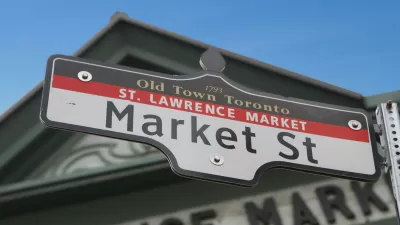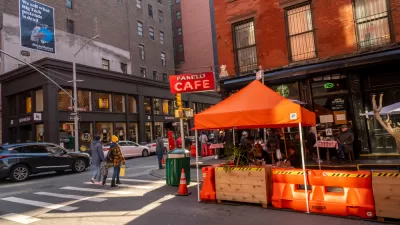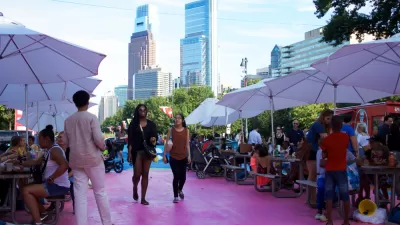Some cities that took the almost unprecedented step to loosen restrictions on outdoor dining in the early days of the pandemic are deciding to make their new outdoor dining rules permanent.

In November, Toronto, the largest city in Canada, became the latest North American city to make its outdoor dining program permanent.
Like many other cities around the continent, Toronto launched an outdoor dining program in June 2020 as a temporary economic stimulus measure for restaurant and retail businesses during the social distancing and stay-at-home orders of the early pandemic. As the pandemic lengthened, outdoor dining programs have been credited with reducing auto-dependency and car-centric urban design and benefitting the bottom lines of restaurants. The result: more and more cities are deciding that dining outside is too popular to abandon, and they're overcoming hurdles to make once-temporary programs permanent.
Pandemic era outdoor dining programs vary by location, but the Toronto's CaféTO program offers a fairly flexible template for duplication. Restaurant operators can apply to operate cafés on sidewalks or in curb lanes, and can also apply to operate patios on private property. In 2022, the program also started offering a matching grant of up to $7,500 to cover 50 percent of the cost of outdoor dining assets through the CaféTO Property Improvement Program. One limitation of the program applies to time: Restaurant operators have until April 2 to apply for curb lane café installations.
For more information on the political process of making CaféTO permanent, see an article by David Rider, Ben Cohen, and Irelyne Lavery for the Toronto Star in October 2021.
After making CaféTO program permanent, Toronto took its place among numerous other North American cities to permanently enshrine outdoor dining programs initially launched as temporary measures during the pandemic, including New York, San Diego, San Francisco, Denver, and Cincinnati. Arlington County, Virginia could also eventually join them. Other cities have lengthened their outdoor dining programs while stopping short of permanent status, including Los Angeles, Seattle, Philadelphia, and Boston. Other U.S. cities have chosen to end their temporary outdoor dining programs, like Manhattan Beach, Pismo Beach, and Paso Robles—all, perhaps surprisingly, located in California.
When the history of the al fresco streets movement during the Covid-19 pandemic is written, however, let it be shown that Vilnius, Lithuania was the first to reshuffle its plans to allow al fresco dining during the pandemic.
The in-roads achieved by outdoor dining programs during the pandemic have been achieved despite political pushback and fair concerns about disabled access and equity. On that latter point, there were several unfortunate episodes during the social upheaval of the summer of 2020 involving brunch crowds sitting idly in temporary al fresco dining spaces while Black Lives Matter protests occurred on adjacent streets. Outdoor dining establishments also faced criticisms for high costs, overcrowding, and, predictably, the loss of space perviously reserved for parking. Speeding cars and a lack of political will (in multiple manifestations) also posed threats to the long-term viability of expanded outdoor dining options.
The fact that so many politicians have decided the effort to preserve and expand on outdoor dining is worth the risk (Toronto's CaféTO program, for example, was approved with support from Mayor John Tory) of angering car drivers is proving to be one of the most lasting and conspicuous legacies of the pandemic.
As I wrote in May 2020, the quick, emergency measures implemented to support restaurant and retail businesses during the pandemic have prioritized the interests of walkability above the motorist's every possible convenience for the first time in decades. With every new city making their outdoor dining programs permanent, the historic moment is evolving into a lasting legacy.

Maui's Vacation Rental Debate Turns Ugly
Verbal attacks, misinformation campaigns and fistfights plague a high-stakes debate to convert thousands of vacation rentals into long-term housing.

Planetizen Federal Action Tracker
A weekly monitor of how Trump’s orders and actions are impacting planners and planning in America.

San Francisco Suspends Traffic Calming Amidst Record Deaths
Citing “a challenging fiscal landscape,” the city will cease the program on the heels of 42 traffic deaths, including 24 pedestrians.

Defunct Pittsburgh Power Plant to Become Residential Tower
A decommissioned steam heat plant will be redeveloped into almost 100 affordable housing units.

Trump Prompts Restructuring of Transportation Research Board in “Unprecedented Overreach”
The TRB has eliminated more than half of its committees including those focused on climate, equity, and cities.

Amtrak Rolls Out New Orleans to Alabama “Mardi Gras” Train
The new service will operate morning and evening departures between Mobile and New Orleans.
Urban Design for Planners 1: Software Tools
This six-course series explores essential urban design concepts using open source software and equips planners with the tools they need to participate fully in the urban design process.
Planning for Universal Design
Learn the tools for implementing Universal Design in planning regulations.
Heyer Gruel & Associates PA
JM Goldson LLC
Custer County Colorado
City of Camden Redevelopment Agency
City of Astoria
Transportation Research & Education Center (TREC) at Portland State University
Jefferson Parish Government
Camden Redevelopment Agency
City of Claremont






























